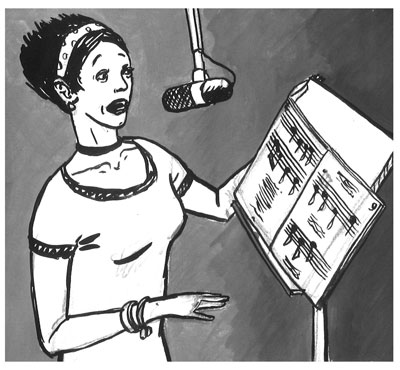Vocal Dyslexia
Vocal Dyslexia - Anatomy and Psychology of Vocal Performance
 Often people ask me how I come up with so much material on singing. I write on the subject for several music publications and have written two books on the subject that do not borrow or use any of the standard ideas of other writers and theorists. The truth is that I have no shortage of material, I simply teach a lot of students how to sing. Almost everything I have ever written on the topic of singing has come to me because of an experience with a student or group of students. In this chapter, I would like to talk about something that has afflicted quite a few of my students over the years:
'Vocal Dyslexia'.
Often people ask me how I come up with so much material on singing. I write on the subject for several music publications and have written two books on the subject that do not borrow or use any of the standard ideas of other writers and theorists. The truth is that I have no shortage of material, I simply teach a lot of students how to sing. Almost everything I have ever written on the topic of singing has come to me because of an experience with a student or group of students. In this chapter, I would like to talk about something that has afflicted quite a few of my students over the years:
'Vocal Dyslexia'.
Dyslexia is defined as a disturbance of the ability to read. Essentially, when a dyslexic person tries to read, the words are all jumbled and mixed up. Vocal Dyslexics have a similar problem - they have a misalignment with regards to the conscious and subconscious minds and the voice as an outcome. Basically, Vocal Dyslexia is the result of a 'short circuit' in the connection between the speech center in the brain and the voice. In many ways, it's similar to a mild form of epilepsy and attention deficit disorder. In fact, I have taught quite a few people with ADD and it has resulted in not only improving their singing abilities, but also their school studies and work performance. By doing special repetitive exercises, I establish a precedent (picture) in the brain and train the brain to give the signal to the voice without any gaps, ie. the thought and response work on a parallel track simultaneously and in synchronicity. In effect, this puts the person in balance and ensures that they will think and act in unison. This also cures both chronic procrastinators and overly manic personalities alike.
Indeed, I meet a lot of different people and different personality types due to my profession. I'd like to share with you some observations that I have made over the years. People with light inner energy benefit from my method the most. They are usually very easygoing, very easily take directions, absorb the information well, and, most importantly, are able to 'fly to the universe' without any obstructions. They take off very easily (lift the sound off their physical body), enjoy the flight and land safely. Usually, these people are already very balanced and make good singers down the road. Another category is the people who have heavy-duty inner energy (the physical weight has no relevance to the issue); to get these people to release their voices from their physical bodies is nearly impossible. During these lessons, I feel like I am trying to lift two three-hundred-pound dumbells. Of course, they can become singers similarly to figure skaters who flawlessly skate their programs but look like "hippos on ice"! I prefer to watch a figure skater who might make a mistake or two, but is nonetheless 'flying above the ice'.
Several years ago at the Juno Awards, I saw the Canadian artist Amanda Marshall perform. Yes, I was able to pinpoint some technical flaws in her singing - after all, I can't help it, due to my occupational hazard of being a Vocal Specialist - but what I was amazed by was her stage presence. She was literally flying above the stage or at least it seemed to me that she did. I could see that other people in the audience were also 'flown and blown away' with her performance. Her performance was the perfect definition of a 'flight to the universe'. Essentially, I use a 'Pavlovian' approach to voice training. You're probably familiar with the story of "Pavlov's Dog." In the early 1900s, Dr. Pavlov, a Russian Chemist and Physiologist, was studying the digestive process in dogs and the interaction between salivation and the action of the stomach. He realized that they were closely linked by reflexes in the autonomic nervous system. Without salivation, the stomach didn't get the message to start digesting. Pavlov wanted to see if external stimuli could affect this process, so he rang a bell at the same time he gave the dogs food. After a while, the dogs - which before only salivated when they saw and ate their food - would begin to salivate when the bell rang, even if no food was present. He called this a "conditioned reflex," an action that has to be learned. Pavlov called this learning process "conditioning." I approach vocal instruction in a similar manner - the exercises I have developed are meant to ensure that my students develop conditioned vocal reflexes so that they will eventually work on 'automatic pilot' upon command.
It is for this reason, that I describe my Vocal Science method as a scientific approach to vocal mechanics; I work mainly on the brain to better the voice. To conclude, the important components that I believe will make an exceptional singer are; good physical vocal abilities, a proportional body, balanced personality, well-rounded intelligence, light inner energy and the capability to receive and then process the proper instruction. When these components are firmly in place, a beautiful performance is guaranteed!










